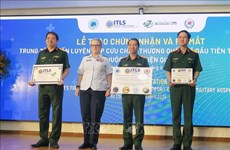Herbal medicine industry looks to boost exports
Vietnam's great potential in exporting herbs for medicinal uses
remains largely untapped, as mass imports of cheap products have left
the industry stagnant.
Vietnam's great potential in exporting herbs for medicinal uses
remains largely untapped, as mass imports of cheap products have left
the industry stagnant, according to speakers at a conference held by
Vietnam Material Medical Society (VIMAMES) last Friday.
The conference was organised to offer information to help local herbalists and farmers hone their competitive edge.
VIMAMES secretary Ta Ngoc Dung, Denmark's Global Competition Fund (GCF)'s representative Tran Huong Giang, and 64 representatives from businesses that sell herbal products attended the event.
Although Vietnam has soil and climate advantageous to plant and process herbal products, the industry has not grown in recent years.
"Vietnam once exported medicinal herbs and herbal medicine, mainly the Golden Star Balm. It brought an important source of foreign currency to the public health branch," Dung said.
In recent years, Vietnam had become a medicinal herb importer, he said, adding that 90 percent of medicinal herbs were imported.
Inadequate management and mass imports of inexpensive herbs.
Dung appealed to the association of herb farmers, herbal product companies, VIMAMES, social-professional organisations, scientists and authorities to revive the national medicinal herb industry.
Under an instruction from the Ministry of Health, VIMAMES has been carrying out a test project on a Vietnam herbal production line (HERBA-V) to enforce World Health Organisation (WHO) guidelines on good agricultural and collection practices (GACP).
The planting and processing techniques will have to meet export requirements. The project will help farmers develop trade names for products.
During the conference, Tran Huong Giang of the GCG, which is funded by the Danish International Development Assistance (DANIDA), spoke about the targets set for several projects.
In five years of implementation, the GCF has given funds to 93 projects in four provinces in Vietnam .
A total of 135 billion VND (6.9 million USD) has been granted to improve the competitiveness of the private sector by improving access to information, business services and internet representation.
They include five projects on business initiatives and national trade, 31 involving business associations, and 57 business-development service providers.
The project on assisting and training farmers to plant Gac fruit (Momordica cochinchinnensis) was carried out by the Vietnam Plant Oil and Food Processing Company (VNPOFOOD) with the support of the GCF.
Products from Gac oil used to treat diabetes and hepatitis are certified by the Ministry of Health and exported worldwide.
Giang also announced that DADIDA had approved a business sector support programme with total fund of 422 billion VND in the 2011 – 13 period.
The programme is waiting for approval from the Vietnamese Government, and should be implemented in January.
Of that total figure, the GCF will fund 216 billion VND to help companies including firms operating in medicinal plants.
Eight localities that benefit from the GCF are Nghe An, Khanh Hoa, Dak Lak, An Giang, Thanh Hoa, Phu Yen, Lam Dong and Can Tho./.
The conference was organised to offer information to help local herbalists and farmers hone their competitive edge.
VIMAMES secretary Ta Ngoc Dung, Denmark's Global Competition Fund (GCF)'s representative Tran Huong Giang, and 64 representatives from businesses that sell herbal products attended the event.
Although Vietnam has soil and climate advantageous to plant and process herbal products, the industry has not grown in recent years.
"Vietnam once exported medicinal herbs and herbal medicine, mainly the Golden Star Balm. It brought an important source of foreign currency to the public health branch," Dung said.
In recent years, Vietnam had become a medicinal herb importer, he said, adding that 90 percent of medicinal herbs were imported.
Inadequate management and mass imports of inexpensive herbs.
Dung appealed to the association of herb farmers, herbal product companies, VIMAMES, social-professional organisations, scientists and authorities to revive the national medicinal herb industry.
Under an instruction from the Ministry of Health, VIMAMES has been carrying out a test project on a Vietnam herbal production line (HERBA-V) to enforce World Health Organisation (WHO) guidelines on good agricultural and collection practices (GACP).
The planting and processing techniques will have to meet export requirements. The project will help farmers develop trade names for products.
During the conference, Tran Huong Giang of the GCG, which is funded by the Danish International Development Assistance (DANIDA), spoke about the targets set for several projects.
In five years of implementation, the GCF has given funds to 93 projects in four provinces in Vietnam .
A total of 135 billion VND (6.9 million USD) has been granted to improve the competitiveness of the private sector by improving access to information, business services and internet representation.
They include five projects on business initiatives and national trade, 31 involving business associations, and 57 business-development service providers.
The project on assisting and training farmers to plant Gac fruit (Momordica cochinchinnensis) was carried out by the Vietnam Plant Oil and Food Processing Company (VNPOFOOD) with the support of the GCF.
Products from Gac oil used to treat diabetes and hepatitis are certified by the Ministry of Health and exported worldwide.
Giang also announced that DADIDA had approved a business sector support programme with total fund of 422 billion VND in the 2011 – 13 period.
The programme is waiting for approval from the Vietnamese Government, and should be implemented in January.
Of that total figure, the GCF will fund 216 billion VND to help companies including firms operating in medicinal plants.
Eight localities that benefit from the GCF are Nghe An, Khanh Hoa, Dak Lak, An Giang, Thanh Hoa, Phu Yen, Lam Dong and Can Tho./.













